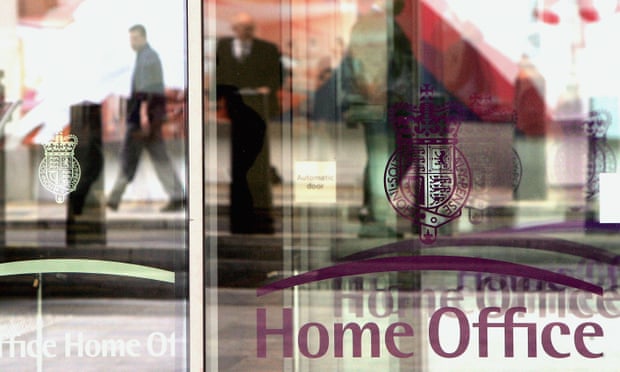Department for Education has agreement to share information of up to 1,500 children a month with Home Office
 | |
| Recently disclosed agreement gives the Home Office personal details of up to 1,500 children a month. Photograph: Scott Barbour/Getty Images |
Education officials have an agreement to share the personal details of up to 1,500 schoolchildren a month with the Home Office to “create a hostile environment” in schools for illegal migrants, a newly released document has revealed.
The agreement, which has been in place since June 2015, is outlined in a memorandum of understanding between the Department for Education (DfE) and the Home Office that was released on Thursday after several organisations made a freedom of information request.
It says: “Where it is suspected that an [immigration offence] has been, or is being committed, the DfE will [share] their data with the HO [Home Office] to assist in the process of identifying potential new contact details (including addresses) for the individual(s) and their family members.”
Later, it adds that the “strategic aims” of the data sharing include re-establishing contact with families the Home Office has lost contact with, to reduce the population of illegal migrants, and to “create a hostile environment for those who seek to benefit from the abuse of immigration control.”.
The memorandum passed to the Guardian, which the DfE said was the latest agreement, says the department would share pupils’ names, recent addresses, school and some attendance records, including earliest and latest attendance dates. That data is collected through the annual school’s census and collated in the national pupil database.
Martha Spurrier, the director of Liberty, said: “This isn’t a data-sharing agreement – it is a secret government programme that turns the Department for Education into a border control force with an explicit aim to create a hostile environment in schools and assist with mass deportation of innocent children and their families. This has Theresa May’s fingerprints all over it.”
The revelation comes after an uproar over plans to include questions on schoolchildren’s nationalities and countries of birth on the annual schools census, which campaigners warned could turn teachers into de facto border guards and stoke divisions in the classroom.
Human rights groups urged parents to boycott the questions, which are not compulsory, and the DfE was forced to respond to the backlash with a public commitment to change the existing data-sharing agreement so that information would not be shared with the Home Office.
In a further attempt to address privacy concerns, the school system minister, John Nash, said in a letter to peers, seen by Schools Week, the new data would be held separately from the national pupil database, and claimed this would prevent other departments from accessing it.
Gracie Mae Bradley, coordinator of Against Borders for Children, said: “This latest report confirms what we always suspected – that the Home Office had intended to access and use nationality data collected from every single pupil in England to help it carry out immigration enforcement against migrant children and families. It seems that only after we intervened in September and wrote to Justine Greening expressing precisely that fear that the policy was overturned.
“However, this newly released MoU makes clear in chilling detail that the DfE still plans to collaborate with the Home Office to share the personal details on over 1,000 children every single month, including name, address, and school details. Using school records to track down and deport migrant children and families is totally indefensible. Schools should be a place where all children feel safe.”
Fears over the collection of children’s nationality and country of birth data took on a fresh urgency earlier this month when leaked Cabinet Office letters revealed that Theresa May, as home secretary, wanted children of parents living unlawfully in the UK to be dropped to the bottom of the lists for school places.
Current laws mean all under-16s have the right to a school place, even if their parents entered the country illegally, a policy in line with international law, including article 26 of the Universal Declaration of Human Rights. Nicky Morgan, education secretary at the time, is understood to have blocked the move.
Jen Persson, coordinator of defenddigitalme, one of the organisations that had requested the memorandum, said: “This collection has lost all legitimacy. It can’t continue to grab every child’s personal data under false pretences of the purposes for its collection.
“It’s time to call off the changes in the school census before its next due date on 19 January and a review needs to take place of the whole use of pupil census data, with full transparency, safeguards and independent oversight built into its safe management.
“If this policy continues it will come at an enormous cost of public and professional trust in all data collection by the department and undermines its data integrity and its reputation.”
A DfE spokesperson said: “Without evidence and data, we cannot have a clear picture of how the school system is working. We take privacy extremely seriously and access to sensitive data is strictly controlled.






No comments:
Post a Comment